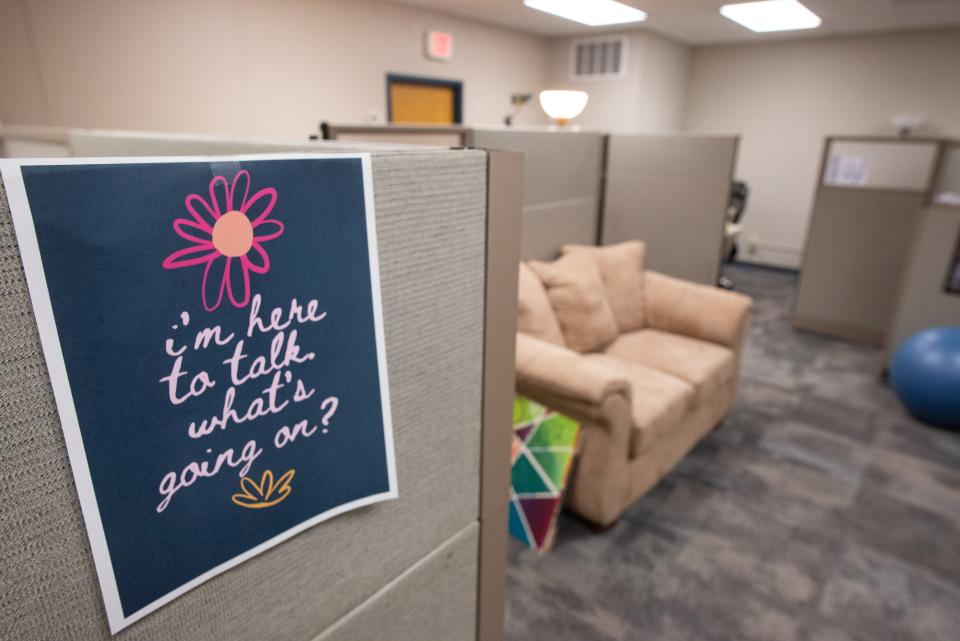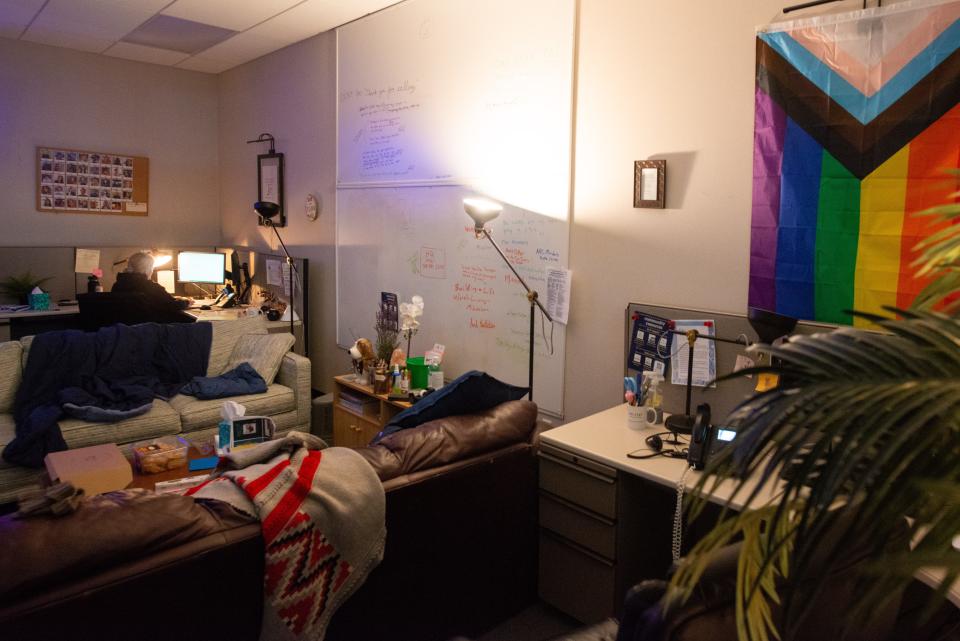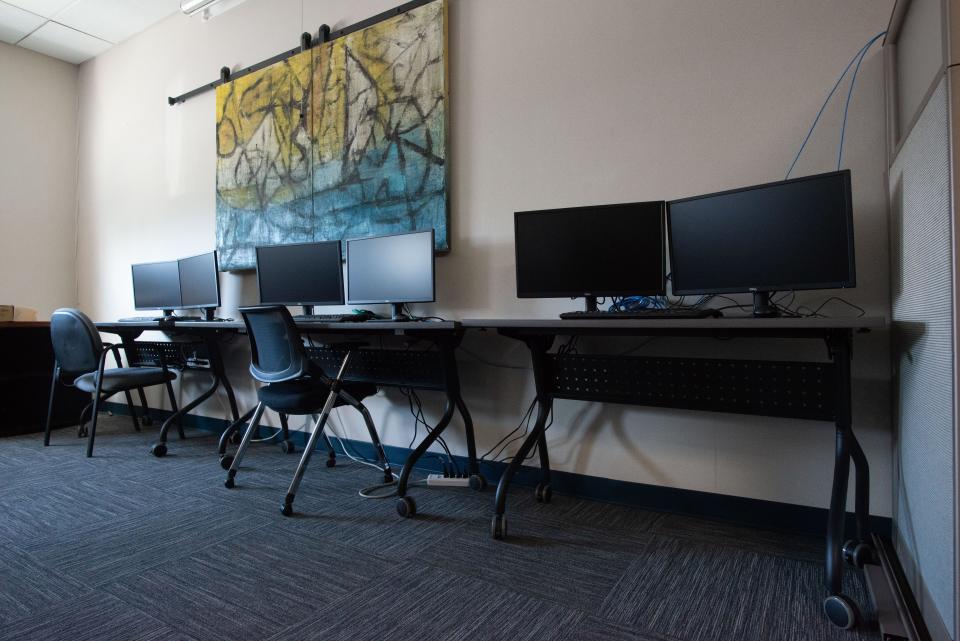A new suicide prevention hotline is coming — what if the Kansas Legislature doesn't fund it?
- Oops!Something went wrong.Please try again later.
One of the most trying part of Monica Kurz's job is Monday morning.
Not being a fan of starting the workweek is not unusual. But Kurz's reasoning is different.
The director of the Kansas Suicide Prevention Headquarters, she dreads coming into the office to find an email she may have missed over the weekend from someone coping with a loved one, even a teenager, in crisis, spending hours waiting in an emergency room to try and get help — or worse.
Over the summer, that part of her job could change considerably — if state officials do their part.
Starting July 16, callers in Kansas and across the country will be able to dial 988 to directly reach the suicide prevention hotline, an effort to make support more accessible for those in mental health crisis.

It is widely believed to be a landmark moment for mental health in the United States and in Kansas, particularly at a time when the COVID-19 pandemic has prompted a surge in those seeking mental health treatment.
"From an individual perspective, we are looking at parents, neighbors, loved ones, church members, having a much clearer idea about how to get help for themselves or someone they love," Kurz said.
But funding and infrastructure to handle the influx of callers has not been sorted out.
Senate Bill 19, that would appropriate $10 million for current and future call centers and support services, is stalled in legislative negotiations.
There is a concern the 988 legislation will move forward only if action is taken on a number of COVID-19-related bills favored by the Kansas Senate.
That could include legislation forcing pharmacists to fill unproven off-label prescriptions for drugs intended to treat or prevent COVID-19. It would also provide exemptions for childhood vaccinations required to attend school or day care in Kansas.

More: Suicide is a 'public health crisis,' experts say. Kansas' rate increased 60% in 20 years.
House Bill 2280, would also prevent Board of Healing Arts investigations related to prescribing Ivermectin, hydroxychloroquine and other treatments, implicating a probe of a sitting senator.
"It is alarming," said Sen. Pat Pettey, D-Kansas City, the top Democrat on the Senate Public Health and Welfare Committee. "I want to be cautiously optimistic (HB 2280) can not move forward and we can actually fund (988). Or maybe we can find another avenue of funding for the rest of that $10 million, without having to be right there in that committee."
How the 988 suicide hotline will work in Kansas
Mike Pirner, a spokesperson for Senate President Ty Masterson, said "there is no connection" between 988 and any COVID-19 bills.
"There are a few topics remaining and all are part of end-of-session discussions about the best way to get remaining priorities across the finish line," Pirner said in an email.
That sentiment was echoed by Sen. Richard Hilderbrand, R-Baxter Springs, chair of the Senate Public Health and Welfare Committee,
Last month, Hilderbrand blocked a bill dealing with Department of Children and Families contracts when the House refused to acquiesce to language restricting health officers from carrying out quarantine orders.
"I just know what I am supposed to do in conference committees," Hilderbrand said. "That's outside of my wheelhouse, whether or not (the COVID-19) bills move or not. (988) is new for the Senate, we've never seen that bill before."
Still, the 988 bill has been years in the making.
The federal government paved the way for 988 to be established in 2020, though it is up to individual states to determine how best to fund many of the services.
That includes the deployment of mobile crisis units to help individuals in distress.

Those units can include law enforcement, social workers or EMTs, as needed, with an eye towards better ensuring individuals in crisis get the exact help they need. Individuals can also be connected with treatment options near them over the phone.
Still, the goal, Kurz said, is for 80% of all calls to be handled by a trained operator on the phone, rather than deploying the mobile crisis units.
If an individual calls the suicide hotline, they are routed to their local call center.
Currently, Kansas Suicide Prevention Headquarters is the primary support line for all but one of the state's 105 counties, with another provider, Comcare, providing service in Sedgwick County.
An additional call center has been started in Johnson County and officials are securing the necessary accreditation to do something similar in Topeka.
If the local facility is at capacity, the call is picked up by a backup line. If that center is busy the call is then sent out-of-state — something that is avoided at all costs, as it can lead to long wait times.
Kurz said upward of 85% of calls are handled in-state, with the goal to be at 90% by the time 988 goes live.
"We've really been able to kind of dissect and see what kinds of work needs to be done in Kansas so that folks' needs are being met when they're dialing 988 in July," she said.
More: Exclusive poll: Overwhelming majority says the US faces a mental health crisis
Funding questions remain unanswered on suicide prevention
But all of this work come at a cost.
Indeed, how best to fund 988 has been a longstanding point of contention, with legislators initially considering a 50 or 20 cent surcharge on cell phone bills, with the idea of creating a more permanent, sustainable funding stream.
But only four states nationally have settled on a phone fee as the way to support their own 988 work and similar efforts in Kansas were met with resistance.
Instead, legislators ultimately settled on using $10 million in state funds for the first year of the hotline, with the potential to re-evaluate the need for a surcharge later, if needed.
Still, Rep. Brenda Landwehr, R-Wichita, chair of the House Health and Human Services Committee, said there were rumblings the Senate may not be interested in funding the entire $10 million, something she said would be disappointing.
"This has been going on for two years," she said. "And for anyone who doesn't have some idea that 988 is happening? It has been in the press, we've talked about it in session. I know that reporters have reported on it. They should know."
Sen. Rick Billinger, R-Goodland, chair of the Senate Ways and Means Committee, said he believed the issue to be important but added it had not yet been on his radar.
"I'm sure there will be discussion when we get back," he said, referring to when legislators return to Topeka on April 25.
But Kurz said there was concern even $10 million might not be enough to fully cover everything legislators wanted to fund. That price tag, she added, could easily go to covering the costs for call centers alone.
And while the state is in a favorable budget position in 2022, a lack of a reliable funding stream could put mental health providers in a difficult position moving forward.
"My greatest fear this whole time has been that we would teach the public that we can meet their mental health and suicide crisis needs over the phone, that we can provide a really good service, that we can say that help is available and follow through with that promise — and then get to a point where the funding turns off," Kurz said.
"And then people aren't placing those phone calls and their needs aren't getting met," she continued. "And I think that's really dangerous."
More: US schools failing in fight against youth mental health crisis, new report card finds
Bill could give greater control over 988 operations to Kansas
Pettey, the Kansas City senator, agreed legislators would need to revisit a more sustainable funding path going forward.
Investing now, she added, would provide cost savings on the back end, with fewer emergency room trips, prison sentences or other, potentially fatal, consequences of placing mental health on the back burner.
"There's just not this complete understanding about what we're talking about and where we're at, not just in the state of Kansas, but in our country when it comes to mental health," Pettey said.
Failing to pass any legislation, Kurz said, would be a blow, not just for the loss of funding but also the missed opportunity to give Kansas officials more control over how 988 is managed in the state.
Under the legislation, the Kansas Department of Aging and Disabilities Services would begin certain mental health services, create an advisory council and hire staff to support the hotline. Call centers would also have statutory responsibilities.
But without the bill, many of those decisions would be made by the operator of the national suicide prevention hotline, Vibrant Emotional Health, which is based in New York.
That would mean taking cues from a well-meaning organization — but one that is not necessarily well-versed in Kansas' unique circumstances.
"I just want to make sure that we're in a position that that we're making decisions here in Kansas about who's answering those phone calls," Kurz said.
If you or someone you know may be struggling with suicidal thoughts, you can call the U.S. National Suicide Prevention Lifeline at 800-273-TALK (8255) any time day or night, or chat online. The Kansas Suicide Prevention Line can be reached at 785-841-2345.
Andrew Bahl is a senior statehouse reporter for the Topeka Capital-Journal. He can be reached at abahl@gannett.com or by phone at 443-979-6100.
This article originally appeared on Topeka Capital-Journal: A new 988 suicide hotline coming; will Kansas fund it?

